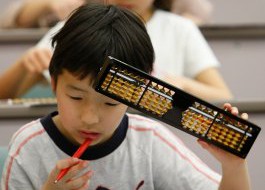
The Organization for Economic Co-operation and Development (OECD) released the results of its 2015 global rankings on student performance in mathematics, reading, and science, on the Program for International Student Assessment, or PISA.
Once again, the United States did poorly compared to other countries and territories, outranked by 38 countries in math, 24 in science, and 22 in reading.
The results are especially stark when looking at US student achievement compared to much poorer countries, Andreas Schleicher, director of education and skills at the OECD, noted on CNN Monday.
"Today the 10% of the most disadvantaged children in Vietnam — and they grow up in very poor households — those children do better than the average American child," Schleicher said.
Vietnam outperformed the US in both math and science. The average income of a citizen in Vietnam is $5,070 yearly, compared with $53,470 for the US.
It's a point that President-elect Trump repeatedly hammered on during his campaign.
"We are rated 28 in the world. The United States, think of it, 28 in the world," he said in a video he uploaded to Facebook earlier this year. "Third-world countries are ahead of us."
Still, Schleicher explained that it's not about the amount of money available for educational spending, but the types of resources the investment benefits.
"It's a lot to do with how to invest those resources," he said." "Whenever these [poorer] countries have to make a choice between, you know, a better teacher and a smaller class, they invest in the capacity, they invest in teaching."




